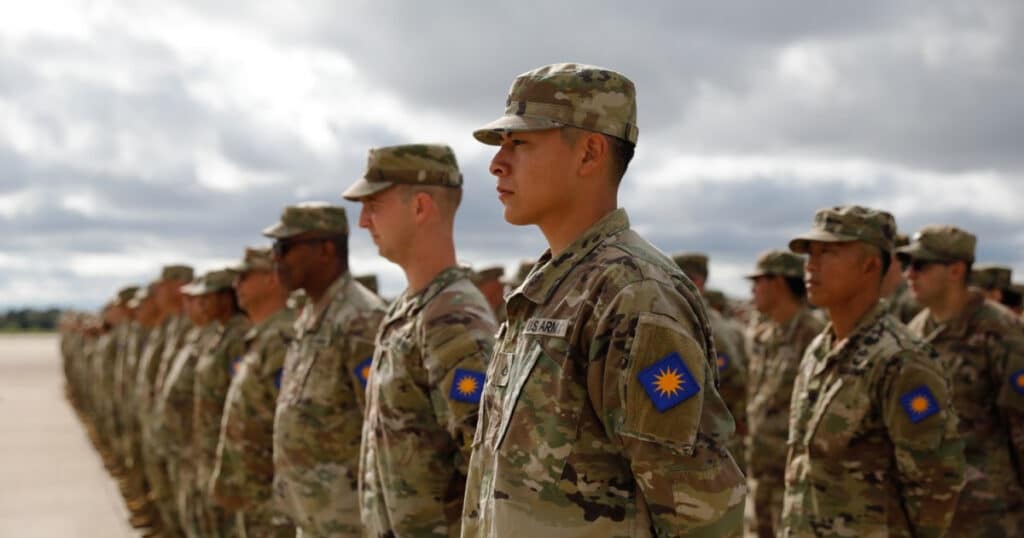
Killing 2 Birds With 1 Stone: How to Find More New Teachers and Military Recruits
America is experiencing two critical shortages at the same time: new school teachers and volunteers for the military.
The shortage of teachers is more specific to locality and subject area, rather than acute. School districts have been on a hiring spree for decades, but many schools are struggling to provide their classrooms with effective teachers.
Simultaneously, the military faces the worst recruitment crisis since it became an all-volunteer force in 1973. The Army, Air Force, and Navy are all failing to reach recruitment goals by the tens of thousands.
But now here is an opportunity to kill two birds with one stone by enabling more former troops to serve as teachers and, in so doing, acquainting more young people with the military.
Prior federal efforts to facilitate troops becoming teachers largely have proved ineffective. For example, in 1993, Congress created the Troops to Teachers program to incentivize states to create veteran-to-teacher hiring programs.
The program, known as TTT, offers participating states a $5 million yearly grant and individual veterans a yearly stipend of $5,000 while the veterans pursue teaching certifications.
To qualify, veterans need to have served a minimum of 48 months in the military within the past three years and have a bachelor’s degree in a relevant subject.
Since the program was established, several states have signed on. However, TTT’s performance has declined in recent years, with participation dropping from over 12,000 veterans hired as teachers in 2014 to fewer than 3,000 hired in 2017.
Because of the floundering participation rate, the Defense Department cut the program in 2020, although Congress temporarily reinstated it last year. But unreliable funding makes it difficult for states to implement consistent TTT programs and might dissuade veterans from participating.
The historic failure of the military services today to attract volunteers has real-world consequences. The Navy has undermanned ships, the Air Force has understrength squadrons, and the Army is considering cutting the number of brigade combat teams—all of which directly threaten America’s national security.
To boost recruitment, the military is offering a slew of benefits, such as hefty sign-on bonuses and allowing recruits to choose a first duty station. None of these attempts, however, seems to be turning the tide.
The biggest predictor that someone will join the military is his or her familiarity with the military. In 2019, 79% of Army recruits reported having at least one family member who had served; 30% of those relatives were the recruits’ parents.
So, it’s no surprise that areas near military installations generally have higher recruitment rates than the national average. These communities also tend to have more Junior Reserve Officer Training Corps programs, and schools encourage and prepare students to take the military’s entrance exam—as they do with the standard college admission tests.
However, with bases largely concentrated in the Southeast, most American youth don’t get much real exposure to the military.
Teacher hiring and retention and military recruitment problems are complex issues and may not seem related. But a potential solution could help alleviate both issues: eliminating state certification requirements for service members to teach.
To help America’s youth engage with the military, states and school districts could hire more veterans as teachers. Having extensive leadership experience and expertise in specific areas, veterans are more disciplined and have more life experience than the average college graduate, making them great candidates for mentorship roles.
Removing unnecessary barriers to veterans becoming teachers would benefit service members and students across the country.
Indeed, research suggests that teacher certification programs have little to no influence on students’ academic performance. Indeed, many state teacher certification requirements push aspiring teachers to attend education colleges that push critical race theory rather than foundational pedagogical concepts, lesson-plan design, and classroom management.
To encourage more veterans to apply for teacher positions, states should eliminate or dramatically reduce certification requirements for service members.
Some states, including Florida, are on the right track by offering temporary teaching licenses to veterans while they complete college degrees.
Having a college or postgraduate degree is important for teachers, but degrees aren’t necessarily good predictors of teacher quality. Rather, a teacher’s subject-specific qualifications tend to be a much greater indicator of student success.
States therefore could consider waiving the four-year bachelor’s degree requirement for those who have served for 48 months in highly sought-after technical fields such as cybersecurity, linguistics, or engineering.
America’s military recruitment crisis and teacher shortage are both serious issues affecting national security and the nation’s future.
States have the tools at their disposal to help with both and should take the lead in resolving these problems.


